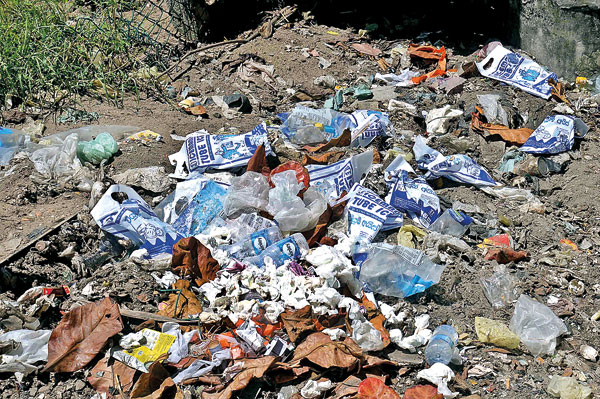News
Single-use plastic ban: Implementation delayed, net to be widened
View(s):By Ryan Casiechetty
The implementation of the ban on single use plastic will be delayed by a week or two, Central Environment Authority (CEA) Director General Hemantha Jayasinghe said.
The government earlier this year announced the ban on the import, production, sale and local use of seven single-use plastic/polythene products from June 1.
This included single use plastic drinking straws, plastic cutlery including plastic yogurt spoons, plastic string hopper moulds and plastic garlands.

Plastic waste strewn in Mount Lavinia as World Environment Day was marked on June 5. Pic by Eshan Fernando
“The gazette is still with the Legal Draftsman as there are some legal clauses that need to be looked into as there have been previous regulations on plastic ban. Initially it was planned for implementation on World Environment Day. But we were informed that it will be released in a week’s time,” he said.
He said several companies have requested a relief period till stocks are cleared.
“Discussions are underway with companies. We have no plan of giving long relief time as this was announced in February this year. Once the law is introduced it will be strictly implemented and raids will take place starting from next month,” Mr. Jayasinghe said.
Environmental and civil society groups, and activists have for long campaigned for the ban, considering the piles of plastic waste and harm they cause.
Director General of the solid waste management unit of the Central Environmental Authority Sarojini Jayasekara, told the Sunday Times public awareness will be raised digitally, while clean-ups are planned.
“People should be prepared to use alternatives to plastic after the single-use plastic ban since June 1,” she said.
Alternatives like wooden and other products made of coconut leaf are being tested, she said.
Also, alternatives such as paper straws, and stainless steel straws could be used. Plastics used in children’s toys also could be hazardous for children in some instances, she added.
Meanwhile, four more single-use plastic items are to be banned, shortly.
About 3,000 chemicals are used to produce microplastics and about 1,000 of them are very harmful to many species, she said.
The head of the Poison Centre, National Hospital Dr Ravi Jayawardena told the Sunday Times, there are many health risks from microplastics.
“Especially when microplastics are consumed, they could cause harm to the liver and kidneys. These could lead to further diseases and imbalances in the human body.’’ Microplastics can harm the ecosystems and wildlife, he said.
“Inflammation in the body, hormonal disruption and other respiratory illnesses could be caused if microplastics are ingested. Various tests and sampling could be done in the food we consume, air sampling and the inhalation exposure assessments,’’ he said.
Meanwhile ‘Pearl Protectors’ coordinator Maleesha Gunawardana said a beach clean-up ‘Nurdle free Lanka’ was done recently. On June 10 and 11 an ocean art exhibition on World’s Ocean Day will be held at One Galle Face Mall.
| 45m yogurt cups discarded a month Sri Lankans toss 45 million yogurt cups a month into the garbage, survey by environmental groups have shown. And a brand audit published in 2020 by the Centre for Environmental Justice for Friends of the Earth revealed that Elephant House is the biggest producer of single-use plastic, along with Coca-Cola, Cargills, Nestle, and Unilever. Every day, Sri Lankans throw away 15 million plastic lunch sheets and 20 million plastic shopping bags, the survey found. Also, the Auditor General reported in January 2020 that about 210,000 metric tonnes of plastic and polythene are discarded annually. Sri Lanka imported 3.35 billion kilograms of plastic worth Rs. 184.3bn in the seven years from 2012 to 2018, the environmental audit report shows. Compared with 2012, imports of plastics have risen by 482.6m kilos in 2018. Of the total, 64% was imported as raw materials. | |
The best way to say that you found the home of your dreams is by finding it on Hitad.lk. We have listings for apartments for sale or rent in Sri Lanka, no matter what locale you're looking for! Whether you live in Colombo, Galle, Kandy, Matara, Jaffna and more - we've got them all!

